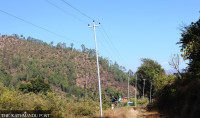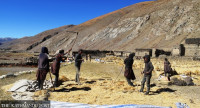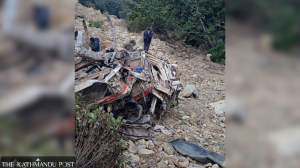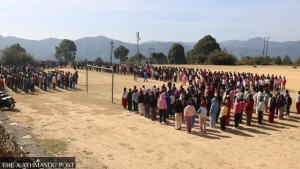Karnali Province
In Humla, cramped quarantine with shared facilities and no running water
Individuals say they are happy to comply with quarantine measures but the state of the facilities is dangerously unacceptable.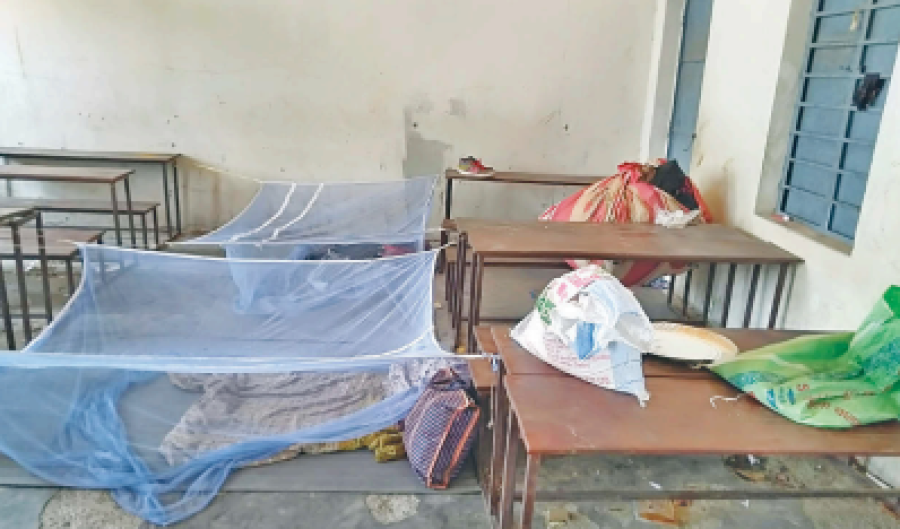
Elisha Shrestha
When Surya Shahi, his brother and grandmother finally reached Humla on May 1 by air after being stranded for a month-and-a-half in Nepalgunj, they were immediately transferred to the Sita Secondary School in Khapunath Rural Municipality. As they had come from abroad, the school would be their home for the next 14 days.
Shahi was mentally prepared to live in quarantine; in fact, he believes that the local municipalities in Humla made the right decision by ensuring that people who came in from elsewhere remained in quarantine for at least two weeks. But when he saw his quarantine quarters, he was shocked.
“When we reached the school premises, the rooms were empty and there weren’t any utensils in the kitchen nor sanitary products in the toilet,” Shahi told the Post over the phone from Humla. “Right now, 15 of us are sharing five rooms. Many of us are sleeping on thin plastic mats provided to us by locals and family members.”
All 15 individuals were supposed to share one toilet and a common kitchen, which can be a health hazard, not just for the spread of Covid-19 but other diseases too. Seeing the dismal state of the quarantine facilities, Shahi, with the help of inmates and some locals, built two temporary shacks out of aluminium siding and some wood to use as additional kitchens.
“We are kept in quarantine for the safety of others, but we don’t feel safe inside ourselves,” he said. “In the kitchen, we were in close proximity with others, although standard quarantine guidelines suggest that we maintain physical distance even with household members.”
With Nepal in the midst of a nationwide lockdown implemented to contain the spread of Covid-19, the federal government has given the local level the responsibility of arranging quarantine facilities for those who’ve returned home from abroad. But many local level governments, like in Humla, do not have the means to provide adequate quarantine facilities, and there is little help from the provincial or the federal governments. This has led to situations like that of Shahi, where individuals are sharing small living spaces, sometimes even the bed.
According to Padam Lama, chair of Simkot rural municipality, they are only following the federal government mandated measures to prevent the outbreak of the disease in the district. But those who are living in quarantine say that the conditions inside the facilities are unsanitary, crowded and unsafe, so much so that they could instead lead to further contamination and an outbreak.
So far, Humla district has not reported any cases of Covid-19.
According to guidelines prepared by the World Health Organization, quarantine accommodations must be equipped with a kitchen, running water and hygiene facilities, along with appropriate medical treatment for existing conditions. Shared rooms require a distance of at least 1 metre between other individuals while the use of shared spaces and cutlery should be minimised.
But in Humla, quarantine facilities are far from the standards prescribed by the WHO.
According to police records, there are around 85 quarantine camps in Humla’s seven local municipalities; 61 of these camps are hosting 988 people. According to Deputy Superintendent Ram Prasad Gharti Magar of the Humla police, the majority of individuals in quarantine have come from India, Kathmandu and Nepalgunj.
“The local authorities have come up with quarantine facilities without any planning. They have simply turned schools, government and hospital premises into quarantine spaces, but they haven’t considered how we are supposed to live without basic facilities,” said Sova Rokaya, who has been in quarantine for a week at the Mansarovar High School of Simkot Rural Municipality.
According to Rokaya, her quarantine is also very crowded, with 29 people sharing five rooms. There is no running water and their sole toilet is broken.
Both Shahi and Rokaya reported that the local authorities had asked them to arrange for their own food and sleeping mattresses.
“Since the quarantine camp is near our village, family members bring us food and clothes every day,” said Rokaya. “We are happy to cooperate with the local authorities and follow the necessary protocols but we don’t accept the way we are being held here.”
Along with the lack of proper living conditions, Rokaya also fears that the people living in quarantine camps may be at high risk of getting Covid-19.
There is also a fear that some individuals in quarantine could already be carrying the coronavirus and could spread it to everyone, given their shared living arrangements. According to Rokaya, although medical personnel check their temperatures regularly, no tests have been conducted on any of them.
Doctors have already warned that poor quarantine facilities could emerge as outbreak hotspots in the country.
Lama, the Simkot chair, acknowledged the lack of rapid diagnostic kits and the poor condition of the quarantine camps, but said that the local government is trying its best.
“Humla is the poorest district in the country, so we have limited funds to arrange all necessary facilities in quarantine camps,” said Lama. “For now, we have assigned at least one medical officer to each quarantine camp.”
The district’s health facilities are also under-equipped and any outbreak of Covid-19 could quickly put them under strain. Dr Nabin Rokaya, medical officer at the Humla District Hospital, said that the hospital is only equipped to treat patients in the early stages of Covid-19. The hospital does not have any ventilators.
Across Nepal’s Far West, where most of the country’s poorest districts are located, the situation is similar. There have been news reports about the dismal state of quarantine camps in Bhojpur and Bardiya districts, with the same problems as in Humla.
As for Shahi and Rokaya, they are just looking forward to completing their time in quarantine and returning home.
“Once I get out of here, I will go to my parents’ house which is just around 45 minutes from the place where I am quarantined,” said Shahi. “I miss them.”




 11.12°C Kathmandu
11.12°C Kathmandu (1).jpg)




